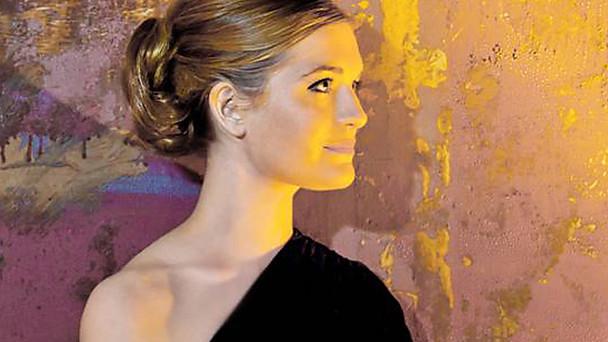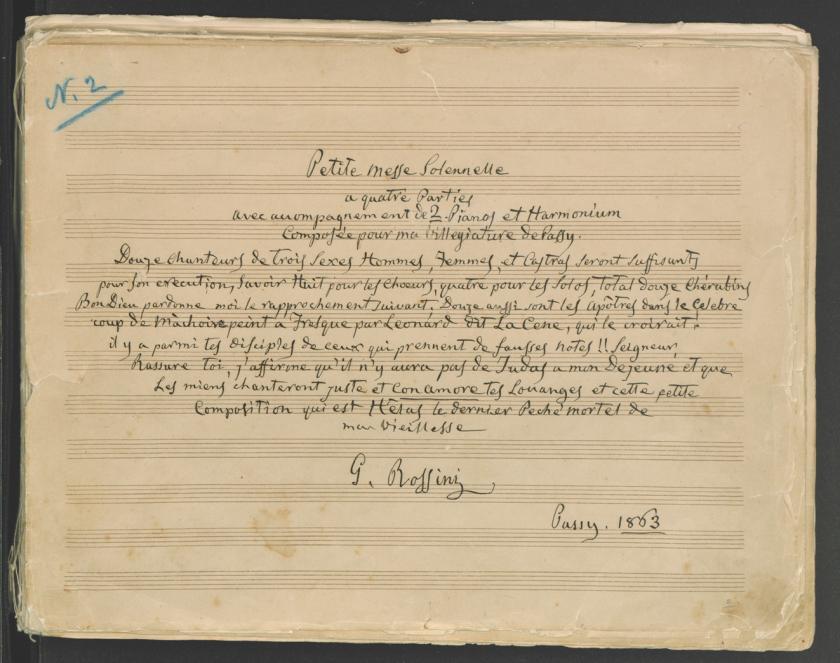“A little skill, a little heart, that’s all,” wrote the 70-year-old Rossini as epigraph to his late, not so small and not always solemn mass. It’s not all, of course. This last major self-styled “sin of old age” (péché de vieillesse) stands in a similar relation to his final, epic opera Guillaume Tell as Verdi’s Falstaff does to his Don Carlos. Only in Rossini’s case the gap was longer, nearly 35 years, and no Otello intervened (Rossini had composed his own operatic version of Shakespeare’s play back in 1816).
The original forces are all that’s petite about this messe – chamber choir, four soloists, two pianos and harmonium – and the sophistication needed to handle its idiosyncrasies needs to be fine-tuned, as it was in last night’s very classy performance.
Our true guide, more spirited than spiritual as required, was not one of the BBC Singers’ principal guest conductors, the expressive Paul Brough, but that most supportive and collegial of pianists Roger Vignoles, only occasionally needing reinforcement from the second player, James Baillieu. Vignoles would certainly have been playing for longer than either of the enticing recitalists with whose programmes this concert clashed, Alexander Melnikov in Shostakovich over at the Wigmore and Paul Lewis venturing into Musorgsky (cursed be the London concert scene for a typical embarrassment of riches).
 Vignoles’ was the announcement of an extraordinary new Rossini style as he glided over the keys – both the physical ones and the range of flats – to let the chorus tread air in the opening Kyrie. His more familiar role as accompanist to the great soloists came in the Gloria solos. Andrew Tortise (pictured right), the true star of the vocal quartet, challenged the magnifying effect of Milton Court’s strange acoustics and won in the martial-pop “Domine Deus”. A replacement for 2013’s newcomer of the year Robin Tritschler, Tortise was no second-best; no wonder a certain director rated him the finest voice of a new production in which he took only a small role.
Vignoles’ was the announcement of an extraordinary new Rossini style as he glided over the keys – both the physical ones and the range of flats – to let the chorus tread air in the opening Kyrie. His more familiar role as accompanist to the great soloists came in the Gloria solos. Andrew Tortise (pictured right), the true star of the vocal quartet, challenged the magnifying effect of Milton Court’s strange acoustics and won in the martial-pop “Domine Deus”. A replacement for 2013’s newcomer of the year Robin Tritschler, Tortise was no second-best; no wonder a certain director rated him the finest voice of a new production in which he took only a small role.
But there were subtle pleasures from the other three young singers, two of them former BBC Radio 3 New Generation Artists. Ruby Hughes (pictured below) soared brightly, a proto-Strauss soprano, in her generous solos while Spanish mezzo Clara Mouriz came out from the shadows in the surprisingly emotional final Agnus Dei. Matthew Hargreaves’ slimline bass-baritone held the course, too, in the long “Quoniam tu solus”, even if we really could have done with a true bass at the bottom of the register.
 The BBC Singers – two more per part, six not four, than Rossini stipulated – were on top, crisp form and though there weren’t many smiles to be seen, they were heard in the bouncing counterpoint of the Gloria’s “Cum Sancto Spiritu”: a reminder that only Poulenc would rival Rossini for insouciance in the footballing monks and tongue-poking angels of his own, freestanding Gloria nearly a century later.
The BBC Singers – two more per part, six not four, than Rossini stipulated – were on top, crisp form and though there weren’t many smiles to be seen, they were heard in the bouncing counterpoint of the Gloria’s “Cum Sancto Spiritu”: a reminder that only Poulenc would rival Rossini for insouciance in the footballing monks and tongue-poking angels of his own, freestanding Gloria nearly a century later.
Yet there’s a heart of darkness in the Petite messe, too, which may or may not be connected with the depressive jester of later years. Its core was the surprising harmonium solo for the Offertory, the usually wheezy instrument breathing for once and phrased beautifully by Malcolm Hicks. Never let it be said that Rossini’s quirky masterpiece doesn’t pull the rug from under our feet. And though purists would argue that it needs to be performed in a luxurious private chapel, as it was at the premiere, Milton Court for once fitted the bill perfectly well.














Add comment